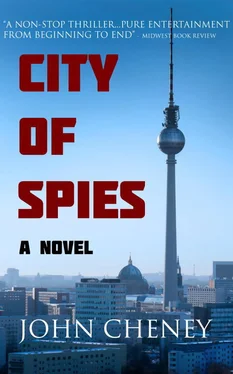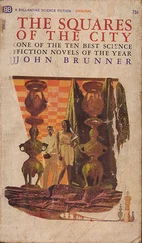“This is raw data, less than two hours old,” Mason said. “We didn’t intercept these orders through electronic signals. I can’t say more. It’s a good chance the Ministry of Defense is blind. All of this started just before dawn. They’re trying to be subtle. We’ve recommended the Allied brigades be put on alert, but no one wants to create a standoff.”
“What about the U.S. Military Liaison Mission?” Hans asked.
Mason shook his head. “They can’t do more than what’s already been done.”
“Are you sure the invasion is on?” Anna asked.
“Definitively, no. But this, taken in context with the information Hans has collected—well, we don’t have the luxury of hoping for the best.”
Hans knew what he had to do. “I have to get this information to the Minister of Defense.”
“No, wait…” Anna pleaded.
Hans shook his head, already determined. “If the Minister doesn’t have this information, someone has to give it to him. And if the Stasi are trying to convince Honecker there’s no threat, then we have to show there’s evidence that backs the case against Scharf.”
“But Scharf is out there, probably looking for you,” Anna said.
“That’s something I’ll have to risk. I’m not going to just sit here and watch the city tear itself apart.” He turned to Mason. “Can I show these dispatches to the Minister without endangering the sources?”
Mason nodded. “You won’t be able to verify them, but they are formatted as official military dispatches. Assuming preparations continue, that will speak for their veracity.”
“Look after her,” Hans said, referring to Anna, “and get her out when you can. I’ll contact you as soon as anything develops.” Hans turned to Anna. “I have to stop this,” he said, then left.
Hans drove to his apartment in Mitte, where he changed into his gray Border Troop uniform. Even on a Sunday morning, he would not be allowed onto the Defense Ministry compound in civilian clothes. The traffic was lighter than on a weekday, but this being a holiday weekend, Hans had to take more detours than anticipated. Crews were dressing the parade route along Karl-Marx Allee, and in some places re-routed the traffic directly into his path. Once he had finished dressing at his apartment, Hans drove again through the holiday traffic, eastward toward Strausberg. He arrived at the Defense Ministry at a quarter to ten. Given the preparations on the eve of the GDR’s 36th anniversary celebration and the chaos of the Scharf investigation, Hans wagered the Minister would be in his office this Sunday.
To Hans’ surprise, the secretary informed him that the Defense Minister had gone north to make a special inspection of the 3rd Air Division in Trollenhagen, just north of Neubrandenburg. This air force unit was charged with the defense of the northern half of the GDR. Hans could not understand why the Minister would now make an impromptu visit to a base far outside Berlin. Perhaps the base commander was good friends with the Minister, and the old man had reached out to his closest allies for support. Or maybe it was a regularly scheduled visit, and the Minister was keeping up appearances. Still, an air force division in Neubrandenburg could offer little help if tens of thousands of troops invaded West Berlin in the south. Hans only knew he had to reach the Defense Minister there.
Scharf was furious when he was told of Kollwitz’s suicide. He could not believe the guards had been so foolish, but there was nothing that could be done now. In truth, Kollwitz’s death was just the latest in a series of events that had kept Scharf off-balance. Beginning with his arrest, Scharf was thrown into a chaotic downward spiral. He believed Kollwitz’s capture and his own release would be the end of his free-fall, but now he was on an even more dangerous precipice. If his co-conspirators had lost confidence in him, it would not be long before someone tried to push him completely out of the picture. He had worked too long and too hard for that. Scharf had always been feared and respected, and now on the cusp of realizing his great invasion, he swore that his comrades would have to return him to his central position of power. With Kollwitz dead, there was only one option to uncover the pesky mole: break Anna. She had proven to be a most difficult prisoner, and would not submit to his pressure. She would have to now.
Scharf arrived at the U-boot wing of Hohenschönhausen. To his horror, Anna’s cell was empty. Scharf sought out a guard and ran into Hübner. “Where is the prisoner?” he inquired.
Hübner looked bewildered. “She was transferred to the custody of the Ministry of Defense two days ago.”
Scharf sank. He never realized how far ahead of him the Defense Minister’s team had been. Scharf turned to walk up the steps toward the ground floor.
Suddenly a thought hit him—how did the Minister’s men know about Anna? Scharf had told them he had an assassin in custody, but he had never disclosed Anna’s full identity or location.
“Wait!” Scharf called Hübner back. “Who took her into custody for the Ministry of Defense?”
“It was a lieutenant colonel in the Border Troops,” Hübner said. He thought for a moment, trying to recall the man’s name. “Um… a Lieutenant Colonel Brandt.”
“Brandt!” Hans Brandt, the Special Liaison to the State Council for Defense Matters. Hans Brandt, good friend of Politburo member Wolfgang Müller, a man who never directly challenged Scharf, but was clearly not an ally. Hans Brandt, who reported directly to the Minister of Defense—had to be the mole. How could he have not have seen it?
Scharf bolted toward the administration building. He rushed into the first empty office and grabbed the phone off the desk. Brüske had spotted Scharf running across the courtyard, and came in soon after, breathless. Scharf dialed the office of the Minister of Defense and asked for Brandt.
“I’m sorry, but Comrade Lieutenant Colonel Brandt just left for Trollenhagen to meet with the Minister,” the secretary on the line told him.
Scharf hung up and turned to Brüske. “Get me a helicopter to Neubrandenburg.”
Brüske nodded and ran off to make the arrangements.
Scharf then phoned Stasi headquarters. “I need to speak to the Minister of State Security right away.”
Hans pushed the Trabant’s engine to its limits, hurtling north along country roads toward Trollenhagen. There were only narrow, winding country roads between Berlin and Neubrandenburg, many of which dated back to the time before cars. The roads were paved, but some were in poor condition, and trees lined much of the route just inches from the edge of the asphalt. Hans could not drive as fast as he wished on these roads. A random pothole or errant driver on the opposite side of the two-lane road could be disastrous. Running into a curve at too high a speed brought equal peril.
Hans drove deep into the Mecklenburg countryside. Here were the fertile remains from the last glacial age: numerous lakes, rolling hills, and thick, deep forest. The land had a sleepy, folklorish quality to it, but more than that, it seemed to hold a mystical sense of foreboding. Certainly the land had a strange and dark history stretching as far back as the Bronze Age. There were legends and some architectural evidence that a Slavic holy site stood on the edge of Lake Tollense well over a thousand years ago. Several miles to the southwest, the town of Penzlin was the site of witch trials, torture, and burnings in the 1600s. More recently, the area was haunted by the ghastly actions of the Nazis. In the picturesque village of Alt Rehse, Nazi doctors began the inhumane and criminal medical experiments that would be employed in concentration camps. During the war there had even been a small Nazi work camp in the woods to the east of Lake Tollense. Once again, the land seemed to have a dark mystical pull, and it added to Hans’ unease as he drove on.
Читать дальше












